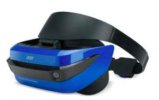The Microsoft "Windows Mixed Reality" system is a headset build by Samsung or Acer, I forgot, and with two controllers. The system was proposed for 400€ alone and 1000€ with a gamer PC laptop and run exclusively under Windows 10.
What impressed me was the precision of the tracking. You move your head or you move in space your body and the picture follow. The second very immersive point is that when you look at your hands, you see the controllers as if you looked at the real ones. And they move according to yours hands movements. Impressive.
The quality of the image if quite good too and th headsets is autonomous in the sense that no detectors are need in the room. So on a technical plan it a good product.
The problems I see with the concept is:
1/ You see the virtual ground so it easy to lose equilibrium I think. The vendor was here, ready to catch me if necessary. Dangerous for a child alone at home.
2/ You are attached by a cable to the PC so you're not totally free to walk as necessary but perhaps you can have a long cable?
But here is the reason why I created this thread: I see this as a big tool to reprogram the mind and not with the same goal as the NO The flashes you got in the eyes are phenomenal! Sure that you do not have to be epileptic! I would be curious to know what the C's have to say about it but I'm quite sure you can open doors in the brains and program people, especially children, with this. Frightening.
The flashes you got in the eyes are phenomenal! Sure that you do not have to be epileptic! I would be curious to know what the C's have to say about it but I'm quite sure you can open doors in the brains and program people, especially children, with this. Frightening.
What impressed me was the precision of the tracking. You move your head or you move in space your body and the picture follow. The second very immersive point is that when you look at your hands, you see the controllers as if you looked at the real ones. And they move according to yours hands movements. Impressive.
The quality of the image if quite good too and th headsets is autonomous in the sense that no detectors are need in the room. So on a technical plan it a good product.
The problems I see with the concept is:
1/ You see the virtual ground so it easy to lose equilibrium I think. The vendor was here, ready to catch me if necessary. Dangerous for a child alone at home.
2/ You are attached by a cable to the PC so you're not totally free to walk as necessary but perhaps you can have a long cable?
But here is the reason why I created this thread: I see this as a big tool to reprogram the mind and not with the same goal as the NO
 The flashes you got in the eyes are phenomenal! Sure that you do not have to be epileptic! I would be curious to know what the C's have to say about it but I'm quite sure you can open doors in the brains and program people, especially children, with this. Frightening.
The flashes you got in the eyes are phenomenal! Sure that you do not have to be epileptic! I would be curious to know what the C's have to say about it but I'm quite sure you can open doors in the brains and program people, especially children, with this. Frightening.


